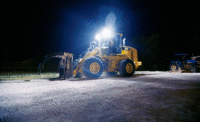Field service is an exciting and versatile industry, yet one that can expose employees to hazardous conditions in certain situation and industries. While on the job, field service workers must spend a lot of time on the road and interact with electrical equipment, heavy machinery, and power tools that could post dangerous risks if not properly approached. Field service businesses prioritize safety practices for their mobile workforce and have even redefined regulations in response to the increased demand for field service following the COVID-19 pandemic.
Employee safety is essential – here are some ways in which field service management (FSM) technology can implement safe behaviors and support mobile workers out in the field.
Applications & automation
Field service jobs can vary in complexity and duration. From residential appliance repair to oil rig or wind turbine maintenance, there are a variety of skillsets needed for each individual job. Field service management applications offer businesses the ability to sort and assign job requests to the proper technicians through optimized scheduling. This technology helps ensure technician safety by making sure that technicians are sent to jobs they are qualified to do, with the proper information, training, and equipment to complete the job safely and effectively.
Not only does this automation in scheduling effectively dispatch workers, but mobile solutions can also help business adhere to safety compliance measures. In order to protect workers, businesses will often put safety parameters in place. For example, capping the total number of work hours per week or limiting travel time and exposure to high-risk jobs are all work constraints leadership may consider when crafting business rules for field service management applications. By optimizing technicians scheduling, field service technology can limit employee’s time onsite, boost productivity, and ensure a healthy work balance for employees.
Mobility management
Field service employees are always on the go, commuting from one job to the next. Mobile devices are key for mobile workforces, offering flexibility, constant communication, and information necessary to complete assigned tasks. Field service management software’s integrated mobility solutions can help keep technicians safe when out on the road by automatically sending real-time GPS updates to customers so employees remain focused on transportation. By also offering maintenance history, technicians know equipment problem areas and pre-existing client information ahead of time.
Additionally, more businesses are integrating virtual reality (VR) and augmented reality (AR) capabilities to support remote assistance for some jobs. As not every issue requires an in-person visit, the use of mobile devices to conduct visual walkthroughs and interactive video sessions with clients and other technicians can reduce any potential risks associated with on-site visits. The enhanced mobility of these workforces through FSM mobile solutions means less experienced technicians can safely respond to job requests knowing they have remote access to veteran employees for guidance.
However, despite their utility and convenience, mobile devices can also be distracting and dangerous for field workers. For companies to viably implement enhanced mobility and align employee safety, they must leverage FSM software that enables context-based policy enforcement. TRUCE software offers contextual mobility management (CMM) that can enforce app usage restrictions and monitor mobile misuse so that employees are not distracted when driving or handling dangerous equipment. This advanced technology can recognize context as simple as the location of the employee, or as complex and specific as the individual’s movements. By providing a structured approach to mobile devices on the job with integrated VR, AR, GPS and CMM, field service organizations can offer all the flexibility and information needed for a successful mobile workforce while also limiting the potential for accidents and misuse.
Communicate clearly
Whether customers and employees still worry about COVID-19 exposure or not, many practices implemented by field service organizations throughout the pandemic still stand as valuable security measures and should continue to be followed to provide the safest environment for all on the job. Ahead of scheduled shifts, workers should complete customized surveys attesting to their current health and ability to perform. Regular employee health assessments will protect the organization operations and help with employee retention.
Additionally, it’s important to continue to clearly communicate safety protocols to customers prior to the site visit to limit risks. Top-tier FSM offers branded customer portals that can house short safety checklists for customers and offer reminders for additional personal protective equipment. By offering digital learning modules on new safety procedures that can be reviewed remotely, organizations can ensure every mobile worker is quickly trained and aware of all new safety protocol and has access to the tools and information necessary to keep them safe when on the job.







